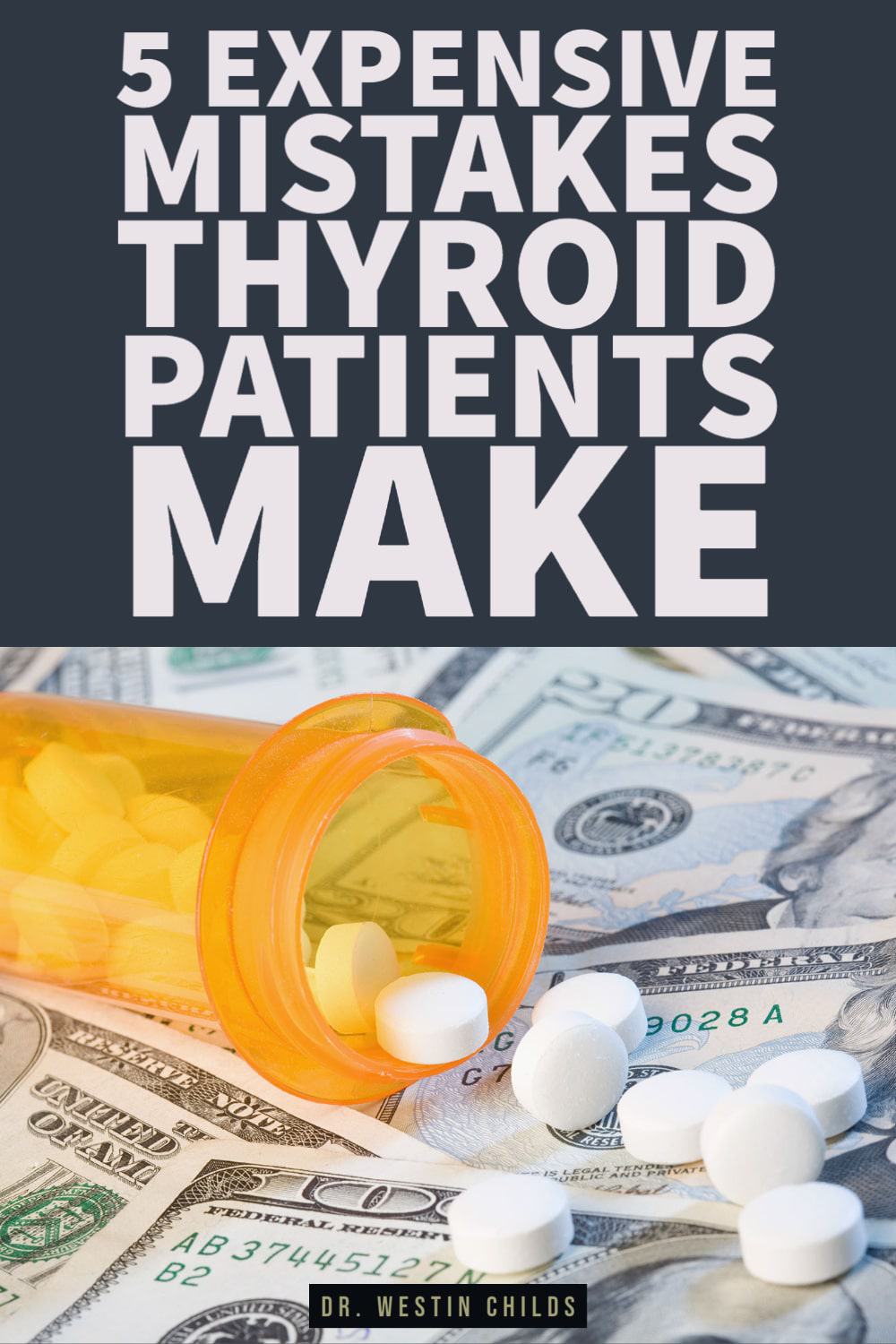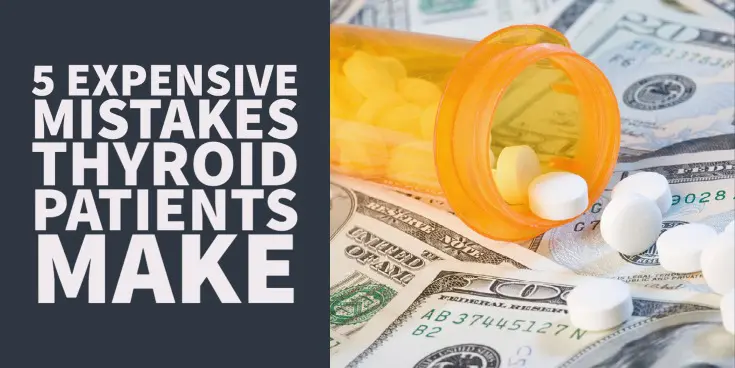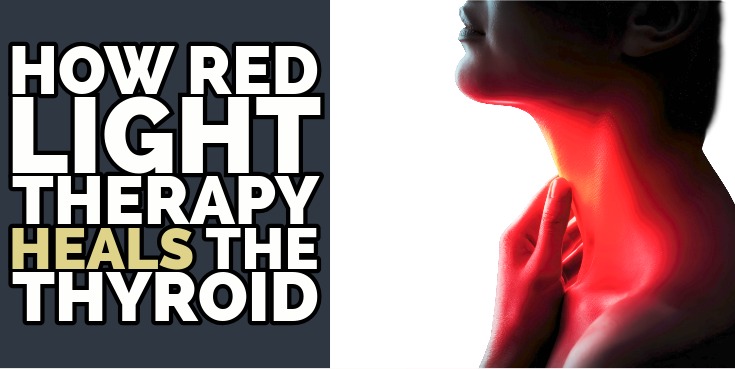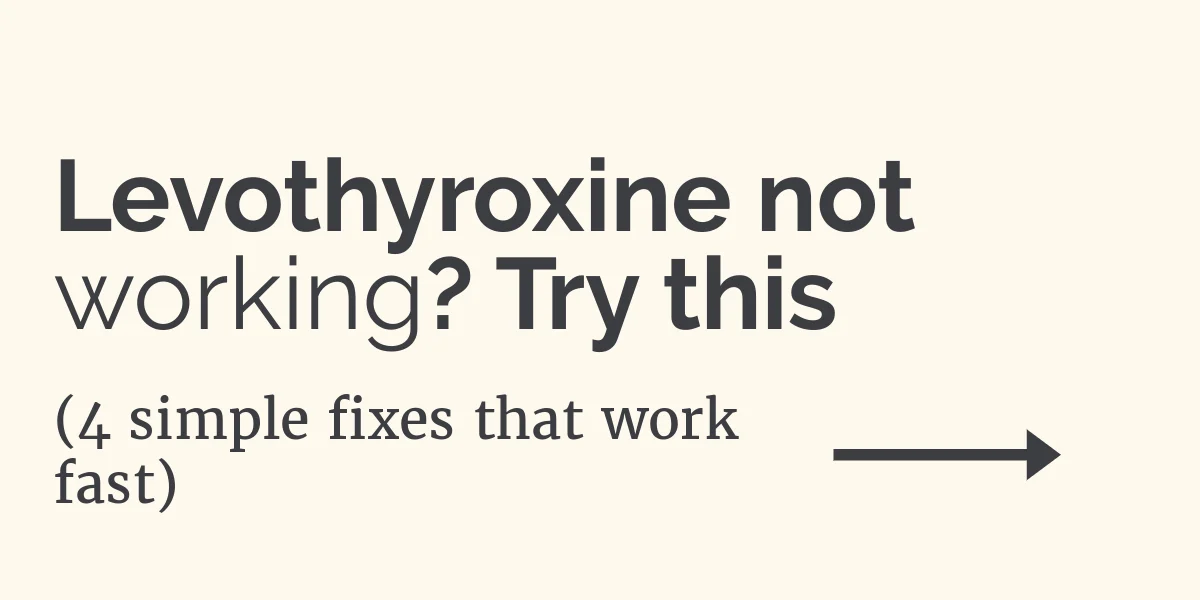As thyroid problems continue to become more and more common among patients of all ages, it’s important to have a complete understanding of what this means for your body.
Unfortunately, the standard approach to treating thyroid conditions is more focused on the benefits of the Doctor and not necessarily the patient.
But, with a little knowledge, you can shift the tide back in your favor.
With this post, you will learn 5 mistakes that thyroid patients make (I see them all the time), how you can avoid them, and how by avoiding them you can improve the overall quality of your life.
Why You Should Focus on your Thyroid First
I don’t think that people realize just how important their thyroid is in their overall health.
Even slight changes in thyroid function can result in huge symptoms that can seriously and negatively impact their quality of life.
That’s one of the main reasons that I focus on treating and reversing thyroid disease! I don’t know any other system in the body that has as much impact as your thyroid on how you feel.
Take for instance another condition such as high blood pressure:
If you dedicated your life to helping people reduce their blood pressure you would be doing a great thing! After all, stroke and heart disease stem from this disease if it’s untreated (1).
But compare that to your thyroid:
Low thyroid function, even just slightly low thyroid function or sub-optimal thyroid function, can lead to symptoms such as weight gain, depression, fatigue, constipation, and overall poor quality of life.
I’ve personally seen patients afflicted by these symptoms experience a complete and near-miraculous turn in their health with just minor changes to thyroid medication.
And that’s why I want to write this article, to help YOU understand how important it is to fix your thyroid if you haven’t.
And that’s why the title of this article focuses on the ‘costly mistakes’ that thyroid patients make. Because I really believe that by failing to focus on your thyroid you do so at great personal cost to yourself and your health.
You only have one life to live, so you better make it count!
With that in mind, let’s talk about the most common mistakes that I see thyroid patients make and why I believe they are extremely costly from the perspective of their health and happiness.
5 Mistakes Thyroid Patients Make (And ones that You may be Making Right Now)
The cost I talk about in these 6 mistakes doesn’t have to do with saving money, it has more to do with the cost of NOT improving your health (Ironically, which will cost you money long-term in the form of medications and insurance premiums).
In fact, many of these mistakes people make come from not spending money on the RIGHT things.
#1. Not Spending Enough Time Finding the Right Doctor
This is probably the single most difficult yet effective thing you can do when it comes to managing your thyroid.
Unfortunately, it may require a lot of time, energy, effort, and frustration to get there but it will absolutely be worth it.
The most frequent question that I’m asked is always along the lines: “Can you recommend a doctor in my area who practices like you?”.
And I wish I could, but there just isn’t a large database of physicians who think out of the box and who practice the type of medicine that I recommend on my blog.
You might think that we have a large network of people, but the truth is that most of us are self-taught and come to our own conclusions over a long period of time.
This means that it can be very difficult to find like-minded physicians who approach thyroid management in the way that I describe here.
To complicate things further, the standard approach that conventional doctors take (about 99% of them) is to simply follow the treatment algorithm for treating thyroid patients without taking into account individual differences, genetic variations, personal history, and so on.
The conventional model is to treat based on the TSH without taking into account virtually any other factors.
Naturally, this approach leads to a fair amount of discontent among thyroid patients who feel like they aren’t being listened to! (2)
I definitely get it and I wish it wasn’t the case, but that is the nature of the system as it stands right now.
The overwhelming majority of Doctors (including primary care physicians and endocrinologists) will take this approach and they will almost all treat you in the same way.
This is great if you are one of the few who fit the standard mold, but it’s incredibly frustrating if you are part of the 20% of thyroid patients (probably more) who don’t (3).
Your best bet is to expend the time and energy to find someone who WILL work with you.
This may mean traveling to a different city or state and it may mean that you have to pay out of pocket initially, but it will most likely be worth it in the long run.
Due to the sheer amount of people that need help, my personal practice filled up within a short time period (less than 1 year) and because I can’t accept any new patients I created a resource designed to help you find a doctor who takes the approach I outline on my blog.
You can find and use that resource here.
#2. Downplaying the Role that Lifestyle Changes Make to your Health
Another thing that I don’t want you to downplay is the importance that your lifestyle has on your body.
Lifestyle factors, as I am referencing here, include the food that you put in your mouth, the quality and amount of sleep that you get each day, how much you exercise, and the amount of stress that you are under.
These factors are FAR more important than you probably realize and they play the MOST important role in managing your overall health.
No amount of thyroid medication or type of thyroid medication will be sufficient to combat poor lifestyle decisions and by not taking care of your body you are definitely sabotaging your thyroid long-term.
I’ve written extensively about how the right type of foods can either help or hurt your thyroid.
I’ve also discussed how stress and cortisol impact your thyroid function in posts such as these.
The moral of the story is that these factors play a huge role in your health and they are 100% within your power and ability to change.
It’s true that you may not be able to force your doctor to switch your medication or order certain tests, but you absolutely have the power to change the food that you eat and to focus on healthy habits which promote better sleep and less stress.
There’s a near infinite amount of literature and scientific research which point out how important these lifestyle factors (4) are and yet they are often the most ignored.
They are even difficult for me to follow!
It can be daunting to change all of these factors at once but if you make a commitment to change one at a time then you will be well on your way to improving your quality of life in the long run.
For instance:
Just start with your diet, read this post on how diet impacts your thyroid, and pick a detailed dietary program to follow.
Once you get your diet on track then you can focus on exercise and so on.
Whatever you do, don’t ignore these factors and instead focus on other factors outside of your control.
#3. Avoiding More Expensive Thyroid Medications (Shying Away Because of Price)
I’ve been accused of accepting money from pharmaceutical companies before so just let me say that I have no affiliation with them whatsoever.
My advice here simply stems from the fact that I truly believe that some people can benefit from the more expensive thyroid medications that exist on the market right now.
Nothing more and nothing less.
And because I believe in them I want to share how they can potentially help YOU.
When it comes to thyroid medications, you have many different options.
All thyroid hormone replacement medications vary in how much they cost, the type of hormones they provide, and the inactive ingredients found inside.

Each of these variables can potentially impact how well these medications work inside YOUR body.
And sometimes switching from one medication to another (even within the same class of thyroid medications) can have a huge impact on your body.
Let’s consider this example:
Most thyroid medications currently contain the T4 thyroid hormone.
While they all have the same thyroid hormone content (thyroxine) they differ in inactive ingredients and the number of fillers/binders that they contain.
Medications like levothyroxine and Synthroid contain T4 but they also contain other ingredients such as lactose monohydrate (which can be a problem if you are lactose intolerant).
Medications like Levoxyl contain T4 but do NOT contain lactose.
Medications like Tirosint contain T4 and have only 3 extra ingredients (water, gelatin, and glycerin).
If you focus on the ‘active’ ingredient of each of these medications then you might be tempted to say that they are all the same.
But that would be a big mistake.
Because, even though they only vary slightly in their other ingredients, those ingredients can have a big impact on certain individuals (5).
And simply switching from Synthroid to Levoxyl or from levothyroxine to Tirosint can potentially help improve your current set of symptoms by improving absorption of the medication and utilization.
So, how does price fit into this?
Unfortunately, the name-brand medications which often contain the fewest ingredients tend to be the most expensive.
It may, therefore, be tempting to stay on the generic $4.00 levothyroxine medication but the reality is you may see a vast improvement in your symptoms by switching.
The newer medications, like Tirosint, may run you up to $127.00 per month (which is about 30x what the generic version costs), but that extra $120.00 could mean the difference between having a better life or continuing to live with brain fog, fatigue, and weight gain.

And don’t let that number scare you because there are coupons and discounts that can drop it down to around $25 per month.
If you can’t afford the high price of Tirosint you may be able to find relief using Levoxyl which is around $15 per month:

The average cash price of other thyroid medications:
- Generic levothyroxine: $4.00 / month
- Synthroid: $9.00 / month
- Levoxyl: $15.35 / month
- Tirosint: $127.00 / month without a coupon or $25.00 / month with a coupon
When it comes to your medication, focus less on price and more on how you feel while taking it.
Once you determine the difference (if any), then you can make a calculated decision about whether or not spending more money on your medication is worth it.
If you can’t afford your medication at all you may be able to talk to your doctor about using samples which may help as well.
*Doctors are often given samples by pharmaceutical companies which they can give out to patients for free but these supplies are limited.
#4. Listening to Your Doctor When it Comes to Supplements
I’m a physician (conventionally trained, by the way) and I know that there is a bias that exists in the conventional world when it comes to virtually any type of integrative or natural treatment.
The bias is to immediately reject its use without second thought or consideration.
Let me share an example that occurred while I was in residency:
In my training, there was a doctor who was more ‘integratively minded’ than the rest of my attendings (this was actually the physician who first introduced me to the idea of testing reverse T3, by the way).
And because of this, he was labeled as sort of an ‘oddball’ even though he was a very competent and knowledgeable physician. In fact, most other doctors didn’t realize why he dabbled in integrative medicine because he was so good at conventional medicine.
One day, after we had seen a patient together, I overheard another physician talking about the supplements that one of his patients was put on.
Specifically, this integrative doctor put a patient with insulin resistance on Berberine and Chromium.
The other doctor was lamenting how over-the-counter supplements simply don’t work and that it was a waste of time and money for him to be using those.
Unfortunately, this particular physician didn’t take the time to read the relevant research before expressing their opinion on the matter.
Because if they did, they would find that there is an abundance of research showing that both berberine and chromium can actually help drop blood sugar and reverse insulin resistance!
Research supporting Chromium:
- A scientific review: the role of chromium in insulin resistance (6)
- Molecular mechanisms of chromium in alleviating insulin resistance (7)
- Effect of chromium supplementation on blood glucose and lipid levels in type 2 diabetes mellitus elderly patients (8)
- Chromium picolinate for the prevention of Type 2 Diabetes (9)
*Note: Not all papers provide support for the use of Chromium, but there are enough studies to warrant some serious research into their use in insulin resistance, weight gain, and type II diabetes.
Research supporting Berberine:
- Efficacy of Berberine in Patients with Type 2 Diabetes (10)
- Application of berberine in treating type 2 diabetes mellitus (11)
- Metformin and berberine, two versatile compounds used in the treatment of common metabolic diseases (12)
- Berberine in the treatment of type 2 diabetes mellitus: a systemic review and meta-analysis (13)
These aren’t just one or two studies, there are TONS and TONS of them.
And this exactly highlights the approach that almost all physicians take when it comes to natural therapies (including supplements).
They immediately dismiss their use without even looking into them because of their bias.
Now, I’m not suggesting that the answer to all of your problems exists by using just one or two supplements.
In fact, quite the opposite.
But I do think that by dismissing them entirely, these physicians are throwing the baby out with the bath water and they are missing out on some potentially tremendous results.
I’ve seen plenty of people (and you can read their reviews here if you don’t believe me) who experience near-immediate results when using certain supplements. To date, we have over 600+ reviews on our supplements and the majority, 80+%, are very positive.
Another sub-group experiences moderate improvement and a small percentage experiences no benefit at all.
The fact that they don’t work sometimes shouldn’t be a reason to avoid them entirely, in fact, there are plenty of medications that simply don’t work for many patients and yet we still use them for others!
Just think of your own personal experience with prescription medications, were they all 100% effective, and did they do exactly what you thought they would?
When it comes to supplements, my opinion is that they are definitely worth a shot, especially if you are ‘supplement naive’ and have never tried them before (these people often experience the BEST results).
The worst thing that can happen to you is that you experience no benefit while the best thing that can happen to you is that you have more energy and a better quality of life.
You can probably tell where I sit on the supplement argument which is why I spend hundreds of hours creating and testing supplements specifically designed for thyroid patients.
Because I believe that they actually work (for most people!).
If your doctor immediately dismisses the use of supplements and tells you they don’t work, then you may want to search for another doctor.
You can always ‘test’ the knowledge of your doctor by asking what basic vitamins do for your body and you’ll probably be surprised how little they actually know.
For instance:
If your doctor doesn’t know what chromium is, or what it does for the body, how can he/she give you a recommendation to avoid using it?
#5. Forgetting That What Worked for you Previously May not Work Now
This is a big one and not something that I think most people even consider.
But the fact is, from a biochemical standpoint, you are not the same person today as you were 10 years ago.
The therapies, treatments, and different things that worked for you in the past will NOT necessarily work for you today.
Why?
Because over time the demand for these things changes!
It changes based on your current weight, the stress that you are under, the normal cyclical nature of your hormones, the food that you put in your mouth, the medical conditions you have, the medications you take, and so on.
All of these factors influence how you will respond (or not respond) to medications and therapies.
To take this a little bit further consider this example:
I was recently talking to a patient of mine who had lost 110 pounds and we were discussing the use of new hormone therapies.
During our discussion, we were talking about things that we tried previously back when this person was 100 pounds heavier.
He wasn’t sure if the therapy was going to work because they had already tried it and it didn’t work.
But I was quick to point out that his body was COMPLETELY different from a metabolic standpoint as little as 1 year ago.
Back then, his blood pressure was higher, he had much more adipose tissue on his body, the demand for thyroid hormone (particularly T3) was much higher, his energy was lower, he wasn’t sleeping as well because of sleep apnea, and so on.
All of these little changes add up and together they create a scenario that is completely different from the place that this person was first in.
Another practical example of this is menopause.
When women go through menopause (and all women will) they go through serious changes which impact almost every cell in their bodies.
And the changes in estrogen and progesterone force changes in weight and even thyroid hormone.
The therapies that worked for you BEFORE you went into menopause you will most likely find are far less effective afterward.
This is completely normal and it has to do with the changes that have occurred in your body.
But it’s very important to understand that just because
You need to be constantly evolving, reading, learning, and understanding what may work for you now.
If you rest on those therapies which worked for you even 10 years ago there is a high probability that they won’t work for you in the near future.
Conclusion
I don’t want you to read this article and get depressed.
Instead, I want you to read this article and find yourself with a renewed feeling that will allow you to get up and make the changes necessary to improve your life.
I know that life can be tough as a thyroid patient (believe me, I’ve personally read over 10,000 comments on this blog over the last few years and I know what you are struggling with) but I am here to tell you that these things can potentially make a difference in your life.
Some of these mistakes may actually cost you some more money in the short term, but the benefits you gain in the long term will make it all worthwhile.
Now I want to hear from you:
Are you making any of these mistakes?
Have you tried making any changes to your life?
Have you been able to improve your quality of life?
If so, which things have worked for you?
Leave your questions or comments below!









Dr Westin, Thank you for your articles, your information has been so helpful. While I’m newly at this thyroid business, I continue to read and grasp as much as possible. I have taken it upon myself to change my script from Armour to Thyrovanz and recently to Thiroyd manufactured in Thailand. I also purchased your T3 conversion booster but have not started this. Your thoughts on Thiroyd and adding in your booster? I started a Integrative Hormone doctor which I recently had blood and urine done but do not include the new thyroid med nor the booster. I also have been on HRT for 10 years which have helped tremendously. I haven’t seen nor talked to my doctor re labs but have appt . I’m not optimal but working towards it. My diet is fine, I’m not gaining weight, my exercise is walking laps in pool daily and walking my dogs. Thank you kindly
Hi Diane,
Glad you are finding them helpful! In regards to my supplements, they are designed to be taken with all types of thyroid medication so it shouldn’t matter which medication you are on (even if it contains T3 thyroid hormone). Hope this helps!
Are you making any of these mistakes?
It’s hard not to make mistakes because patients go to their health insurance covered physicians who focus symptoms rather than root cause which is the gut and internal organs and “input” of various other factors such as diet, environment, etc. then write prescriptions. I didn’t have health insurance for 6 years, had Badger Care 2 years, even less helpful as they limit your appointments and treatments, but they don’t tell you that. Prescription Gabapentin gave me severe dry eye it blew all the veins out in my eyes. I sought help from a conventional nurse who calls herself a sex hormone expert, hardly. She gave me too much NP Thyroid and I went on & off in 2 days and then became worse than when I started! I had 18.5 RT3 at the time and she did not think to try Cytomel alone. She did give me a safer prescription for BHRT in 2015, and an introduction to adaptogens; but without appropriate testing she was making the healing process longer and more expensive. That is what some alternative doctors do, and they are no better than allopathic doctors for doing it. I think you and Dr. Mercola are the best doctors so far who really know what they are talking about and who really have the capability of helping people. I stayed on the BHRT 2015-2018, it helped my hypo & libido. I had hyperplasia in 2018 and went off of it, my hypo became worse. I finally found a doctor who would do the right appropriate tests this year and had even higher RT3, she gave me 5 mgs Cytomel. I started at 2.5 mgs on Thanksgiving Day, results are nothing short of miraculous! Dry eye almost completely gone! More energy! Better focus! More stamina! I don’t think this Doctor really knows what she is doing, she asks me what I want and she does it. That is not very assuring, but better than nothing! I still cannot lose weight so I really need to follow your blogs because there are no Doctors around here like you AT ALL. This Dr. I have tested me for EBV, I am positive, another complication or concern. A Lyme nurse suggested that has many of the same symptoms and we can get it from mosquitoes, but dear God, I cannot even think of considering that at the moment.
Have you tried making any changes to your life?
Yes, have followed MANY online doctor’s blogs for help and insight into what might be my health condition, they were the only hope I had. Clinic doctors using my BadgerCare health insurance for brain CT scans, TSH tests, and useless talk appointments. I knew better but was sometimes side tracked into “symptom” treatment rather than “root cause” treatment and life style changes. I really need to get my amalgams out for example, I need to detox internal organs and do parasite cleanse. For the EBV, decide if I want to try Valtrex, would it be better than lemon balm, monolaurin, and L-Lysine for the EBV? I’m afraid of kidney damage but what about the serious diseases of EBV? So scared!
Have you been able to improve your quality of life? I was on BHRT in 2013, but they doctor never tested me first, and I think my experiences with it are that it helped with my EBV and hypo fatigue. It did not make me lose weight that I need to lose, and was told it would. What I really needed was to address the hypo/RT3 and after the 60 mg NP Thyroid disaster (too much thyroid) I’m now on the 2.5 cytomel and feeling better. Unfortunately I lost more than 10 years of participation in my own life. 🙁 I’m sad for that and trying to regroup and figure out what I can do now that I have lost those years. I am still not optimal and have only one more endo I can see. All of this going doctor to doctor takes so much time and energy, the doctors and health insurance companies literally cause people to give up. I feel better on the 2.5 mg cytomel but know I am not optimal and don’t know when or if to increase dose or go on NDT. That is the depressing part of this illness, not having knowledgable doctors. Not being able to live your life to it’s fullest due to an illness that no one recognizes or who will treat you correctly.
If so, which things have worked for you? I am doing better on the 2.5 mg Cytomel. i still have throat tightness and wonder if my small nodules are going to kill off my thyroid eventually, if I don’t get optimal. I would be a good case study for you because I could tell you about my progression and things no one associates with thyroid– it has immediately helped my very bad dry eye syndrome from meibomian oil thickening, it has somewhat helped dizziness and brain fog but I am not optimal yet. My sleep is somewhat disrupted already, am tired but not immediately able to sleep like when I am not on it. I slept very good before but could take NO STRESS of getting up early. I need help so bad, I am losing out on living my life.
Dr. Child’s
Thanks for the information. For your vitamin supplements are they to be taken 3-4 hours after you take your thyroid medication or are they designed to be taken at the same time as your medication.
Thanks, Grace
Dear Dr. I appreciate your blog soooo much. I tried to switch to Tirosint but had a very bad experience. They use porcine gelatin and I react badly to pork. I developed muscle twitching and still struggle with it. Magnesium makes me feel worse. I get overall body shaking.What should I do?
Thanks
Elize
Fantastic article – very well written and most of all, it’s objective. There is too much hype in the Thyroid disease community over one treatment or another being the answer for everyone when it’s most definitely not the case. My Dr and I tried me on so many treatments and NDT even landed me at the cardiologist’s with massive heart palpitations. They magically went away as soon as I stopped the NDT. Now I take Tirosint with compounded slow release T3 and it’s been life-changing for me. It took 2 years of trial and error to get to my ‘right’ treatment; fortunately I have a great Dr that listens and is willing to work with me. I still get a thyroid lab panel 4 times a year to make sure I’m still on track. I pay $45/month copay for Tirosint (112 mcg), I will check out the manufacturer’s savings program, thank you for the tip!
Hi Anne,
You’re welcome and I’m glad you enjoyed it!